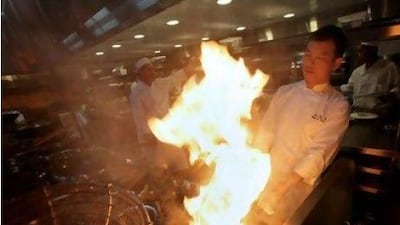Hakkasan, the upmarket Chinese restaurant brand owned by the Abu Dhabi company Tasameem, plans to open an outlet in Jumeirah Emirates Towers in Dubai in November.
More Business news: Editor's pick of today's headlines
Last Updated: May 19, 2011
Dubai Holding unit battles to restore Tunisie Telecom IPO Emirates International Telecommunications is calling for an IPO of Tunisie Telecom to be put back on track, as it faces strike action and opposition from the government. Read article
Atic to raise Globalfoundries stake The Advanced Technology Investment Company plans to increase its stake in chip-maker Globalfoundries to above 90 per cent by the end of the year. Read article
Central Bank to curb property speculators New loan regulations will mean better deals for first-time buyers. Read article
600 pilots needed in budget carrier flydubai's expansion The budget carrier flydubai plans to hire 600 pilots over the next four years as it plans for an eventual fleet of 54 short-haul Boeing 737s. Read article
Mud-slinging over rare earth Industry Insights // China could soon face stiff competition in the lucrative rare earth metals market. Read article
It will join another popular London restaurant brand, The Ivy, which is opening a branch there over the summer.
It will be Hakkasan's second branch in the UAE, with the first opening in the Emirates Palace in the capital a year ago. Hakkasan's Michelin-starred flagship restaurant is in London's West End.
"I think we wanted to establish ourselves in Abu Dhabi first, partly because our owner is in Abu Dhabi," said Niall Howard, the chief executive of Hakkasan. "That was the priority, but we always had eyes on Dubai, and really it took us this time to find a suitable site."
Tasameem bought its shares in the Hakkasan Group in 2007 from Alan Yau, the Hong Kong restaurateur who also founded the Wagamama chain.
Its Dubai restaurant will be wholly owned by Hakkasan, involving an investment of "millions of dollars", Mr Howard said, declining to provide a specific figure.
The restaurant is taking on 150 staff. All of its chefs must be Chinese.
The company has further expansion plans in the region.
"We have taken offices in Dubai for our expansion plans and we have a managing director now based in Dubai," Mr Howard said.
"We may not open too many Hakkasans in the region because we don't want to dilute the brand," Mr Howard said.
"But having said that, we will end up with several, and we're looking at locations such as Bahrain, Doha and, slightly further afield, Beirut."
He said the company also planned to open a restaurant in Mumbai in the coming weeks.
The Hakkasan group also owns Yauatcha, a Michelin-starred London dim sum restaurant, which it wants to expand through the region.
"We're quite happy to roll out a number and we'll be starting that this year," Mr Howard said. "We're actively looking for a site in Dubai and we have a site in Abu Dhabi."
He said the Abu Dhabi Yauatcha was not likely to open before the end of this year.
Hakkasan also has a restaurant in the Fontainebleau Resort in Miami.

